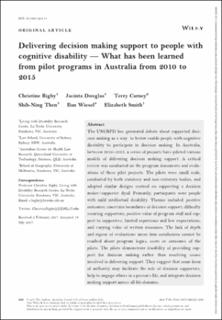Delivering decision making support to people with cognitive disability — What has been learned from pilot programs in Australia from 2010 to 2015
Journal article

Åpne
Permanent lenke
https://hdl.handle.net/11250/3032432Utgivelsesdato
2017Metadata
Vis full innførselSamlinger
Originalversjon
Bigby, C., Douglas, J., Carney, T., Then, S., Wiesel, I. & Smith, E. (2017). Delivering decision making support to people with cognitive disability — What has been learned from pilot programs in Australia from 2010 to 2015. Australian Journal of Social Issues, 52, 222–240. https://doi.org/10.1002/ajs4.19Sammendrag
The UNCRPD has generated debate about supported decision making as a way to better enable people with cognitive disability to participate in decision making. In Australia, between 2010–2015, a series of projects have piloted various models of delivering decision making support. A critical review was conducted on the program documents and evaluations of these pilot projects. The pilots were small scale, conducted by both statutory and non-statutory bodies, and adopted similar designs centred on supporting a decision maker/supporter dyad. Primarily, participants were people with mild intellectual disability. Themes included: positive outcomes; uncertain boundaries of decision support; difficulty securing supporters; positive value of program staff and support to supporters; limited experience and low expectations; and varying value of written resources. The lack of depth and rigour of evaluations mean firm conclusions cannot be reached about program logics, costs or outcomes of the pilots. The pilots demonstrate feasibility of providing support for decision making rather than resolving issues involved in delivering support. They suggest that some form of authority may facilitate the role of decision supporters, help to engage others in a person's life, and integrate decision making support across all life domains.
